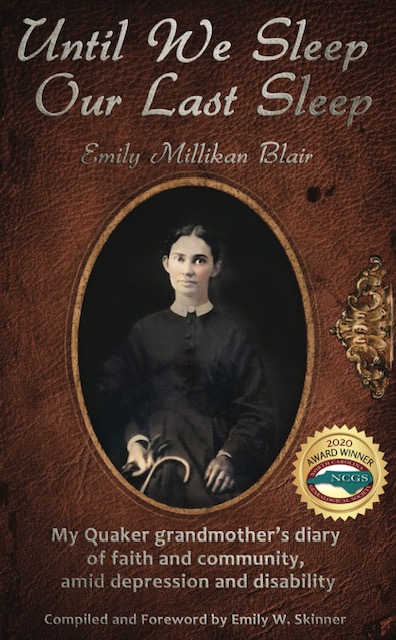
Until We Sleep Our Last Sleep
Compiled and Foreword by Emily W. Skinner
Though you wouldn’t know it from her diary, Emily Millikan Blair was a descendant of North Carolina’s Millikan and Blair families who saved patriots during the Revolutionary War, and supported the abolitionist movement of the Civil War. While she mentions many relations, she does not boast of their contribution to history.
Instead, she writes of her devotion to her husband, John Addison Blair, her Quaker church Springfield Friends, New Garden Boarding School (which later becomes Guilford College) and, most prominently, God.
As a whole, the diary might feel like an anthropological study of Quaker womanhood, but Emily doesn’t cook or bake, wash, clean or raise her children as most women in her community. She was a farmer’s wife and, though disabled, she gave birth to five children. She writes honestly about her physical challenges and depression in plain Quaker speak. She shares daily gratitude to God for each day she is permitted to live and records deaths as an almost devotional practice.
The redundancies of her plain speak from 1889 evolve with modern times as we enter the 1920s. She speaks of her daughters most often as Mrs. Dougan Moffitt, Mrs. Arthur Lee Stilwell or later Mrs. J.W. Peace as opposed to their given names. Her sons are mentioned frequently by their full names: Fred C. Blair and Jesse C. Blair. As Emily ages, her children and grandchildren are mentioned in a less formal manner. However, it is evident that she is writing for future readers, providing an historical record of who she is behind the veil of family in Randolph County, N.C.
She doesn’t mention that she and John A. Blair courted during the Civil War, but the facts are evident when she mentions being a student at New Garden Boarding School in 1864, and their marriage recorded in 1864. She also doesn’t provide details as to whether she was born disabled or became such, leaving unsaid things we might presume are either too mundane, or perhaps unspeakable.
The diary is exact and unedited. These are her words, as she wrote them over a century ago, yet her message of daily self encouragement and appreciation are timeless.
Includes an index of 650+ North Carolina family and friends.
“The diary was a pleasure to read. Emily’s testimony and faith were always vibrant in the midst of trials of all sorts, and any guilt in reading someone else’s diary disappears in gratitude for such a window into a remarkable soul.”
—North Carolina Genealogical Society